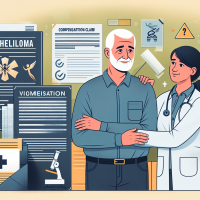Mesothelioma Veteran Compensation Guide: A Compassionate Journey
As a registered nurse with over 10 years of experience in oncology and patient support, I understand the profound impact a mesothelioma diagnosis can have, especially for our veterans. This guide is written from my heart to yours. I have walked alongside many patients and their families, witnessing the emotional and physical struggles mesothelioma brings, and I want you to know you are not alone on this journey.

Understanding Mesothelioma and Its Impact
Mesothelioma is a rare cancer primarily linked with asbestos exposure, and it brings along numerous challenges, both medical and emotional. This condition not only affects physical well-being but also weighs heavily on mental and emotional health. I have seen firsthand the struggles faced by veterans who were exposed to asbestos during their honorable service. Their experiences resonate deeply with me, and I am here to help demystify this complex condition through compassionate insight and practical advice.
In this guide, I will share comprehensive insights on:
- What mesothelioma is and how it is diagnosed
- Understanding the staging system and treatment options
- Navigating veteran benefits and compensation claims
- Practical advice for managing emotions and building resilience
- Valuable internal resources for further support
Before proceeding, please note that the information provided here is meant to support and guide you, not replace professional medical or legal advice. Always consult with healthcare professionals and reputable sources for your specific situation.
Diagnosing Mesothelioma: What to Expect
From my experience, early diagnosis is critical to managing mesothelioma effectively. When you or a loved one are facing the uncertainty of a possible mesothelioma diagnosis, it’s important to be informed about the diagnostic process:
Biopsy Procedures and Tests
Common procedures include thoracoscopy, thoracentesis, and various imaging tests. In a thoracoscopy, a thin tube is inserted into the chest to look for abnormal tissues, while thoracentesis involves drawing fluid from the space around the lungs for analysis. These tests are pivotal in confirming a diagnosis.
Understanding Mesothelioma Staging
The staging of mesothelioma is generally divided into four stages, each indicating the extent of the disease:
| Stage | Description |
|---|---|
| Stage I | The cancer is localized and has not spread extensively. |
| Stage II | The cancer has spread to nearby tissues. |
| Stage III | There is significant local spread to multiple areas. |
| Stage IV | The cancer has metastasized to distant parts of the body. |
Understanding the stage of the disease can help in tailoring the treatment to the individual needs of the patient.
Treatment Options: Medical and Emotional Support
I feel a deep responsibility to provide actionable insights regarding treatment options for mesothelioma. We both know that the path ahead might seem overwhelming, but there is hope and assistance available. Treatment options typically include:
- Surgery: Procedures aimed at removing as much of the cancerous tissue as possible.
- Chemotherapy: The use of drugs to kill cancer cells or stop them from growing.
- Radiation Therapy: Targeted radiation to destroy cancer cells.
- Experimental Treatments: Participating in clinical trials that may offer promising new therapies.
Each treatment plan is tailored to the patient’s unique situation, and discussing these options with your healthcare team is crucial. Alongside these medical treatments, addressing the emotional toll of a mesothelioma diagnosis is equally important. I encourage you to seek support from mental health professionals who specialize in oncology and to communicate openly with family and friends about your feelings.
Navigating Veteran Benefits and Compensation
For veterans diagnosed with mesothelioma, there are additional challenges, but also unique avenues for support. I have worked with many veterans who not only face the emotional challenges of this disease but also the bureaucratic hurdles involved in securing their rightful benefits. Understanding the compensation process can provide a sense of empowerment during an incredibly trying time.
Understanding Your Benefits
The Veterans Affairs (VA) offers benefits for those diagnosed with conditions acquired during service, such as mesothelioma from asbestos exposure. These benefits may include:
- VA disability compensation
- Healthcare services specifically tailored for veterans
- Assistance with filing claims for asbestos exposure injuries
It is essential to gather all medical records, any evidence of asbestos exposure, and consult with a specialist in veterans’ benefits to ensure you are provided with every available support option.
Internal Link Suggestion: Explore mesothelioma treatment options for more detailed medical guidance.
Coping with Emotional Challenges and Building Resilience
Being diagnosed with mesothelioma often triggers intense emotions such as fear, anxiety, and grief. From my years in patient support, I know how critical it is to acknowledge these feelings and address them with compassion. Here are some personal strategies that have helped me and many others navigate these turbulent times:
Strategies for Emotional Well-being
- Mindfulness and Meditation: Daily mindfulness practices or meditation can help center your thoughts and reduce anxiety. I often suggest a few minutes each day to engage in deep, mindful breathing.
- Talk Therapy: Engaging with a mental health professional can help you process your feelings and bring clarity to your situation. I have seen many patients benefit from this support.
- Support Networks: Connecting with others who understand your journey can be profoundly healing. Consider joining support groups, either in person or online, where you can share experiences and advice.
By nurturing your emotional health, you lay a stronger foundation for facing the medical challenges ahead. Remember, self-care and open conversations with loved ones are powerful tools in your healing process.
A Personal Reflection:
From my heart to yours, I know that courage is not the absence of fear but the determination to move forward despite it. I have witnessed the strength in everyday heroes like you, and every step forward, no matter how small, is a testament to your resilience.
Moving Forward: Next Steps and Additional Resources
As you navigate this challenging journey, here are some actionable steps you can take:
- Stay Informed: Regularly consult reputable sources such as the National Cancer Institute, American Cancer Society, and Mesothelioma Applied Research Foundation for the latest updates.
- Seek Specialized Care: Connect with healthcare teams experienced in treating mesothelioma to discuss personalized treatment plans.
- Utilize Veteran Resources: If you are a veteran, make sure you are tapping into VA benefits and compensation available to you. Document your exposure history and leverage your military records as needed.
- Engage with Support Groups: Look for local or online communities where you can share experiences and gain encouragement. I personally recommend visiting veteran community forums and mesothelioma support groups.
For further reading, you may also want to explore our article on Understanding Asbestos Exposure, which provides additional context on the root causes of mesothelioma.
Remember, while the road may seem long and arduous, you are not alone. Reach out to trusted healthcare professionals, legal advisors, and support networks. I stand with you, offering every bit of my experience and empathy to help guide you through these uncertain times.
Information on treatment guidelines current as of May 2025.






